北京课改版六年级英语上册全册知识点汇总
(完整word版)北京版六年级英语上册重点总结
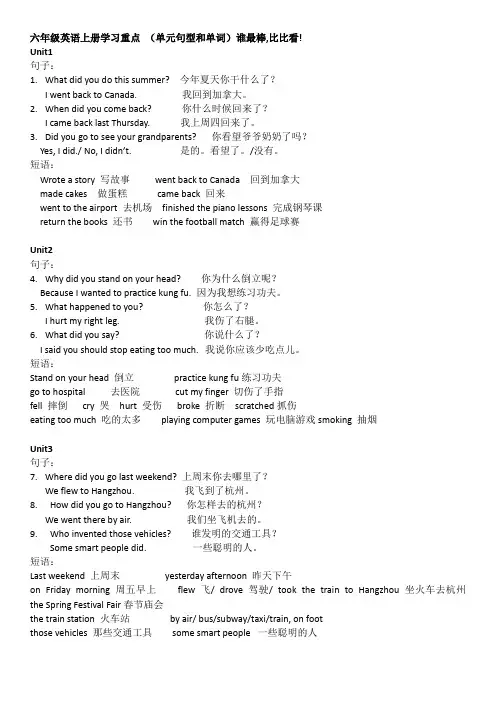
六年级英语上册学习重点(单元句型和单词)谁最棒,比比看!Unit1句子:1.What did you do this summer? 今年夏天你干什么了?I went back to Canada. 我回到加拿大。
2.When did you come back? 你什么时候回来了?I came back last Thursday. 我上周四回来了。
3.Did you go to see your grandparents? 你看望爷爷奶奶了吗?Yes, I did./ No, I didn’t.是的。
看望了。
/没有。
短语:Wrote a story 写故事went back to Canada 回到加拿大made cakes 做蛋糕came back 回来went to the airport 去机场finished the piano lessons 完成钢琴课return the books 还书win the football match 赢得足球赛Unit2句子:4.Why did you stand on your head? 你为什么倒立呢?Because I wanted to practice kung fu. 因为我想练习功夫。
5.What happened to you? 你怎么了?I hurt my right leg. 我伤了右腿。
6.What did you say? 你说什么了?I said you should stop eating too much. 我说你应该少吃点儿。
短语:Stand on your head 倒立practice kung fu练习功夫go to hospital 去医院cut my finger 切伤了手指fell 摔倒cry 哭hurt 受伤broke 折断scratched抓伤eating too much 吃的太多playing computer games 玩电脑游戏smoking 抽烟Unit3句子:7.Where did you go last weekend? 上周末你去哪里了?We flew to Hangzhou. 我飞到了杭州。
北京版六年级上册知识点汇总,推荐文档
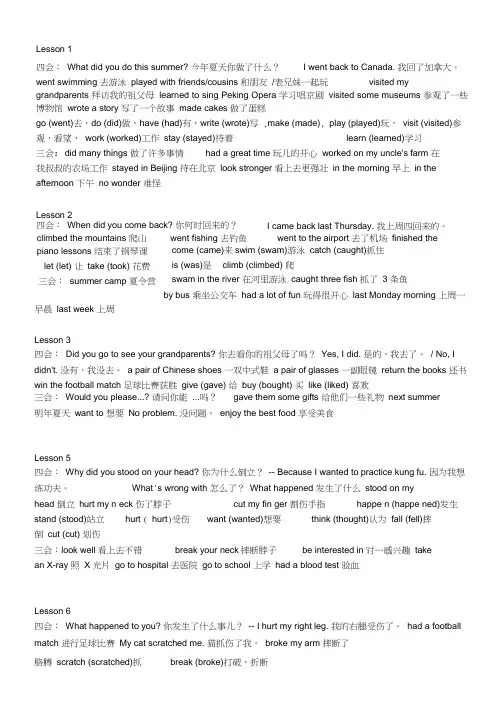
Lesson 1四会: What did you do this summer? 今年夏天你做了什么? I went back to Canada. 我回了加拿大。
went swimming 去游泳 played with friends/cousins 和朋友 /表兄妹一起玩 visited mygrandparents 拜访我的祖父母 learned to sing Peking Opera 学习唱京剧 visited some museums 参观了一些博物馆 wrote a story 写了一个故事 made cakes 做了蛋糕go (went)去,do (did)做,have (had)有,write (wrote)写 ,make (made), play (played)玩, visit (visited)参观,看望, work (worked)工作 stay (stayed)待着learn (learned)学习 三会:did many things 做了许多事情had a great time 玩儿的开心 worked on my uncle's farm 在 我叔叔的农场工作 stayed in Beijing 待在北京 look stronger 看上去更强壮 in the morning 早上 in theafternoon 下午 no wonder 难怪 Lesson 2四会: When did you come back? 你何时回来的? come (came)来 swim (swam)游泳 catch (caught)抓住 is (was)是 climb (climbed) 爬 swam in the river 在河里游泳 caught three fish 抓了 3 条鱼 by bus 乘坐公交车 had a lot of fun 玩得很开心 last Monday morning 上周一早晨 last week 上周Lesson 3四会: Did you go to see your grandparents? 你去看你的祖父母了吗? Yes, I did. 是的,我去了。
六年级上北京版知识点
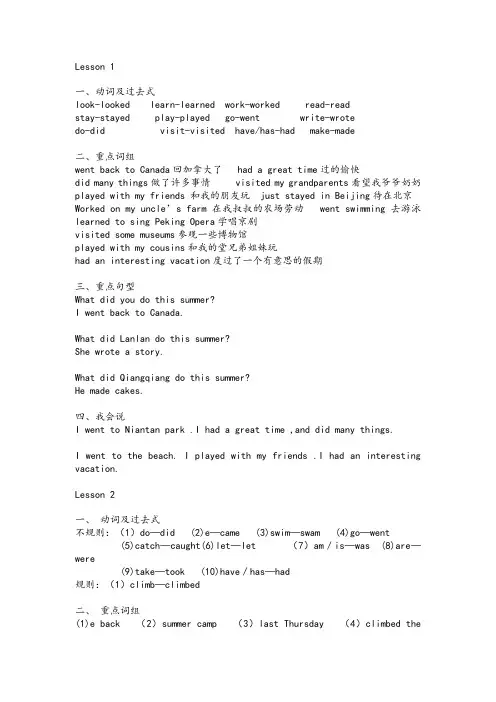
Lesson 1一、动词及过去式look-looked learn-learned work-worked read-readstay-stayed play-played go-went write-wrotedo-did visit-visited have/has-had make-made二、重点词组went back to Canada回加拿大了 had a great time过的愉快did many things做了许多事情 visited my grandparents看望我爷爷奶奶played with my friends 和我的朋友玩 just stayed in Beijing待在北京Worked on my uncle’s farm在我叔叔的农场劳动 went swimming去游泳learned to sing Peking Opera学唱京剧visited some museums参观一些博物馆played with my cousins和我的堂兄弟姐妹玩had an interesting vacation度过了一个有意思的假期三、重点句型What did you do this summer?I went back to Canada.What did Lanlan do this summer?She wrote a story.What did Qiangqiang do this summer?He made cakes.四、我会说I went to Niantan park .I had a great time ,and did many things.I went to the beach. I played with my friends .I had an interesting vacation.Lesson 2一、动词及过去式不规则:(1)do—did (2)e—came (3)swim—swam (4)go—went(5)catch—caught(6)let—let (7)am/is—was (8)are—were(9)take—took (10)have/has—had规则:(1)climb—climbed二、重点词组(1)e back (2)summer camp (3)last Thursday (4)climbed themountains回来夏令营上周四爬山(5)swam in the river (6)went fishing (7)caught three fish在河里游泳去钓鱼抓了三条鱼(8)good for you (9)had a lot of fun你真好过的非常快乐三、重点句型When did you e back? When did she finish the piano lesson?I came back last Thursday. She finished piano lessons last week.When did he go to the airport?He went to the airport last Monday morning.四、我会说My parents and I took a trip last weekend..I flew to Hangzhou. We went there by airWe visited many places and saw green hills, blue water, small bridges, and old houses.We came back last weekend.Today I was happy.Today we had a lot of fun.Lesson 31.动词及过去式do—didbuy—boughtgive—gavelike—liked2.重点句型Did you go to see your grandparents?Yes, I did./No, I didn’t.Did you return the books?Yes, I did./No, I didn’t.Did they win the football match?Yes, I did./No, I didn’t.3 .重点词组a pair of Chinese shoes a pair of glassesSure, what can I do for you? No problem.4.我会说My parent and I went to Xiangshan by car last weekend. We saw a lot of colourful leaves on the hills. We walked around and took many photos. We stayed there for three hours and went back home.Lesson5一、重点单词wrong aches terribly practice kung fu有问题的疼很非常练习功夫Interested lucky dangerous X-ray neck对…感兴趣幸运危险的 X-射线脖子二、动词及其过去式happen-happened stand-stood do-did want-wanted 发生站立做想要think-thought is-was hurt-hurt don‘t-didn’t认为,想是受伤没有,不是isn’t -wasn’t不是三、重点词组My neck aches terribly practice kung fu be interested in 脖子疼的厉害练习中国功夫对----感兴趣四、重点句子1. What’s wrong with you? 你怎么了?2. What’s happened to your neck? 你的脖子怎么了?3. I’m very interested in it. 我对这个非常感兴趣。
北京课改版六年级英语上册全册知识点汇总
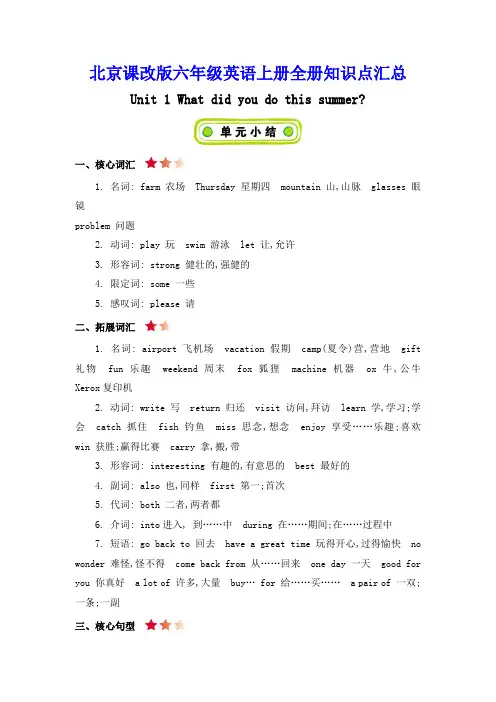
北京课改版六年级英语上册全册知识点汇总Unit 1 What did you do this summer?一、核心词汇1. 名词: farm 农场Thursday 星期四mountain 山,山脉glasses 眼镜problem 问题2. 动词: play 玩swim 游泳let 让,允许3. 形容词: strong 健壮的,强健的4. 限定词: some 一些5. 感叹词: please 请二、拓展词汇1. 名词: airport 飞机场vacation 假期camp(夏令)营,营地gift 礼物fun 乐趣weekend 周末fox 狐狸machine 机器ox 牛,公牛Xerox复印机2. 动词: write 写return 归还visit 访问,拜访learn 学,学习;学会catch抓住fish 钓鱼miss 思念,想念enjoy 享受……乐趣;喜欢win 获胜;赢得比赛carry 拿,搬,带3. 形容词: interesting 有趣的,有意思的best 最好的4. 副词: also 也,同样first 第一;首次5. 代词: both 二者,两者都6. 介词: into进入, 到……中during 在……期间;在……过程中7. 短语: go back to 回去have a great time 玩得开心,过得愉快no wonder 难怪,怪不得come back from 从……回来one day 一天good for you 你真好 a lot of 许多,大量buy… for 给……买…… a pair of 一双;一条;一副三、核心句型1. — What did you do this summer? 你今年夏天干什么了?— Oh, I went back to Canada. 噢,我回加拿大了。
解读:这是询问某人做过什么的句型及其回答,是 what 引导的一般过去时的特殊疑问句。
北京小学英语知识点总结6年级上册
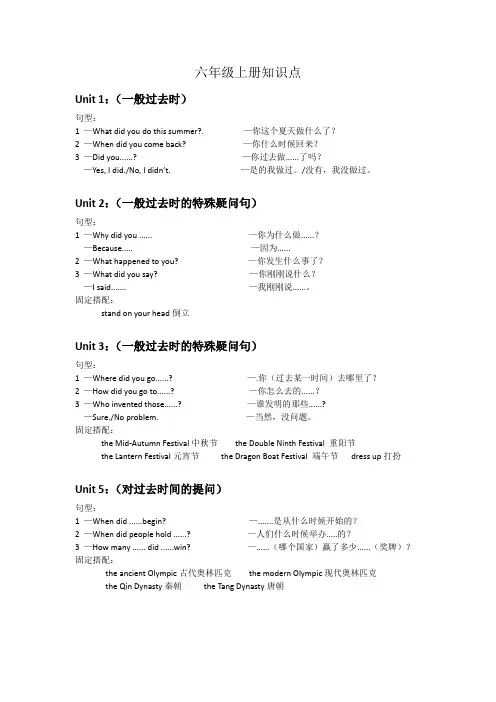
六年级上册知识点Unit 1:(一般过去时)句型:1 —What did you do this summer?. —你这个夏天做什么了?2 —When did you come back? —你什么时候回来?3 —Did you......? —你过去做......了吗?—Yes, I did./No, I didn’t. —是的我做过。
/没有,我没做过。
Unit 2:(一般过去时的特殊疑问句)句型:1 —Why did you ...... —你为什么做......?—Because..... —因为......2 —What happened to you? —你发生什么事了?3 —What did you say? —你刚刚说什么?—I said....... —我刚刚说......。
固定搭配:stand on your head倒立Unit 3:(一般过去时的特殊疑问句)句型:1 —Where did you go......? —.你(过去某一时间)去哪里了?2 —How did you go to......? —你怎么去的......?3 —Who invented those......? —谁发明的那些......?—Sure./No problem. —当然,没问题。
固定搭配:the Mid-Autumn Festival中秋节the Double Ninth Festival 重阳节the Lantern Festival元宵节the Dragon Boat Festival 端午节dress up打扮Unit 5:(对过去时间的提问)句型:1 —When did ......begin? —.......是从什么时候开始的?2 —When did people hold ......? —人们什么时候举办.....的?3 —How many ...... did ......win? —......(哪个国家)赢了多少......(奖牌)?固定搭配:the ancient Olympic古代奥林匹克the modern Olympic现代奥林匹克the Qin Dynasty秦朝the Tang Dynasty唐朝Unit 6:(穿戴)句型:1 —What is he wearing? —他穿了什么?—He is wearing ........... —他穿的是......2 —.What does he wear .....? —他在....(什么场合)穿什么?—He wears....... —他穿......。
六年级英语上册 各单元重点知识 北京版
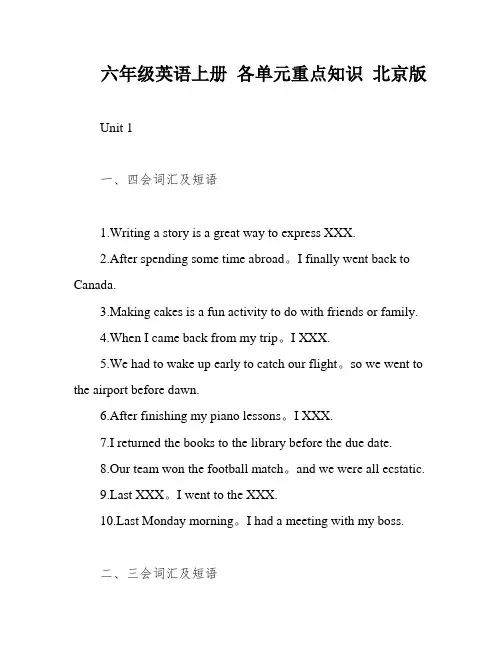
六年级英语上册各单元重点知识北京版Unit 1一、四会词汇及短语1.Writing a story is a great way to express XXX.2.After spending some time abroad。
I finally went back to Canada.3.Making cakes is a fun activity to do with friends or family.4.When I came back from my trip。
I XXX.5.We had to wake up early to catch our flight。
so we went to the airport before dawn.6.After finishing my piano lessons。
I XXX.7.I returned the books to the library before the due date.8.Our team won the football match。
and we were all ecstatic.st XXX。
I went to the XXX.st Monday morning。
I had a meeting with my boss.二、三会词汇及短语1.I had a great time at the party last night.2.I visited my grandparents over the weekend and had a lovely time with them.3.XXX.4.I XXX.5.XXX.6.Learning to sing Peking Opera was a XXX.7.XXX.8.No XXX's so successful。
XXX.9.After working out regularly。
北京课改六上英语知识点G6U6
Unit 6 What is he wearing?Lesson 19词汇:tie领带Mr 先生goodbye再见wear 穿,戴serious严肃的jeans牛仔裤pajamas睡衣短语:wait for 等待the taller man更高一点的男人 a lawyer一名律师a blue suit with a silver tie一套蓝色的西装配着一条银色的领带 a pair of black shoes一双黑色的鞋a denim skirt 一条牛仔短裙 a hoody连帽衫句型:What is he wearing? 他穿的什么?He is wearing a blue suit with a silver tie.他穿的蓝色西装配银色领带。
课文复述:Mike is waiting for his dad’s friend. The taller man who is wearing a blue suit with a silver tie is Mr Brown. He’s a lawyer. He looks serious.Lesson 20词汇:singer歌手stage舞台dress服装;套裙sing唱短语:on stage 在台上pretty dresses漂亮的连衣裙wear a pair of sunglasses 戴一副太阳镜at work上班 a suit with a tie一套西装配一条领带at school 在学校formal clothes 正式的服装casual clothes 休闲的服装句型:What does she wear on stage ?她在台上穿什么?She wears pretty dresses. 她穿漂亮的连衣裙。
语法点:1. Purple is her favourite colour.= Her favourite colour is purple.= She likes purple best.她最喜欢的颜色是紫色。
北京小学英语知识点总结6年级上册
固定搭配:
birth-yearanimal生肖as...as...像...一样nameafter由...命名
1—Whendid......begin?—.......是从什么时候开始的?
2—Whendidpeoplehold......?—人们什么时候举办.....的?
3—Howmany......did......win?—......(哪个国家)赢了多少......(奖牌)?
固定搭配:
theancientOlympic古代奥林匹克themodernOlympic现代奥林匹克
六年级上册知识点
Unit1:(一般过去时)
句型:
1—Whatdidyoudothissummer?.—你这个夏天做什么了?
2—WhendidyoucoFra bibliotekeback?—你什么时候回来?
3—Didyou......?—你过去做......了吗?
—Yes,Idid./No,Ididn’t.—是的我做过。/没有,我没做过。
固定搭配:
standonyourhead倒立
Unit3:(一般过去时的特殊疑问句)
句型:
1—Wheredidyougo......?—.你(过去某一时间)去哪里了?
2—Howdidyougoto......?—你怎么去的......?
3—Whoinventedthose......?—谁发明的那些......?
3—Whatsizedoyouwear?.—你穿多大号的?
—Iweara........—我穿.......
固定搭配:
waitfor等待onstage在舞台上atwork在工作atschool在学校
北京版六年级英语上册重点总结
北京版六年级英语上册重点总结第一篇:北京版六年级英语上册重点总结六年级英语上册学习重点(单元句型和单词)谁最棒,比比看!Unit1 句子:1.What did you do this summer? 今年夏天你干什么了? I went back to Canada.我回到加拿大。
2.When did you come back?你什么时候回来了? I came back last Thursday.我上周四回来了。
3.Did you go to see your grandparents?你看望爷爷奶奶了吗?Yes, I did./ No, I didn’t.是的。
看望了。
/没有。
短语:Wrote a story 写故事went back to Canada 回到加拿大 made cakes 做蛋糕came back 回来went to the airport 去机场finished the piano lessons 完成钢琴课 return the books 还书win the football match 赢得足球赛Unit2 句子:4.Why did you stand on your head?你为什么倒立呢? Because I wanted to practice kung fu.因为我想练习功夫。
5.What happened to you?你怎么了? I hurt my right leg.我伤了右腿。
6.What did you say?你说什么了?I said you should stop eating too much.我说你应该少吃点儿。
短语:Stand on your head 倒立practice kung fu练习功夫 go to hospital去医院cut my finger 切伤了手指 fell 摔倒cry 哭hurt 受伤broke 折断scratched抓伤eating too much 吃的太多playing computer games 玩电脑游戏smoking 抽烟Unit3 句子:7.Where did you go last weekend? 上周末你去哪里了?We flew to Hangzhou.我飞到了杭州。
最新北京课改版小学英语六年级上册单元知识总结(全册)
最新北京课改版小学英语六年级上册单元知识总结(全册)Unit 1 What did you do this summer?During the summer。
I went to a farm with my family。
We stayed there for a week and had a great time。
We played with the animals and went fishing in the pond。
It was a lot of fun.One day。
we went hiking in the mountains。
It was a bit difficult。
but we managed to reach the top。
The view was amazing。
We could see for miles and miles。
I took some photos with my glasses.On another day。
we had a problem with our car。
It wouldn't start。
We had to call a mechanic to come and fix it。
It took a few hours。
but we eventually got it working again.Overall。
it was a really enjoyable n。
I learned a lot about farm life and nature。
I also got to spend some quality time with my family.I came back from n feeling refreshed and happy。
I'm already looking forward to next year's trip!biscuit5.介词:with和,带着三、课文解析及改写本单元主要讲述了小女孩Lucy在踢足球时不小心受伤,并被送到医院检查的故事。
- 1、下载文档前请自行甄别文档内容的完整性,平台不提供额外的编辑、内容补充、找答案等附加服务。
- 2、"仅部分预览"的文档,不可在线预览部分如存在完整性等问题,可反馈申请退款(可完整预览的文档不适用该条件!)。
- 3、如文档侵犯您的权益,请联系客服反馈,我们会尽快为您处理(人工客服工作时间:9:00-18:30)。
北京课改版六年级英语上册全册知识点汇总Unit 1 What did you do this summer?一、核心词汇1. 名词: farm 农场Thursday 星期四mountain 山,山脉glasses 眼镜problem 问题2. 动词: play 玩swim 游泳let 让,允许3. 形容词: strong 健壮的,强健的4. 限定词: some 一些5. 感叹词: please 请二、拓展词汇1. 名词: airport 飞机场vacation 假期camp(夏令)营,营地gift 礼物fun 乐趣weekend 周末fox 狐狸machine 机器ox 牛,公牛Xerox复印机2. 动词: write 写return 归还visit 访问,拜访learn 学,学习;学会catch抓住fish 钓鱼miss 思念,想念enjoy 享受……乐趣;喜欢win 获胜;赢得比赛carry 拿,搬,带3. 形容词: interesting 有趣的,有意思的best 最好的4. 副词: also 也,同样first 第一;首次5. 代词: both 二者,两者都6. 介词: into进入, 到……中during 在……期间;在……过程中7. 短语: go back to 回去have a great time 玩得开心,过得愉快no wonder 难怪,怪不得come back from 从……回来one day 一天good for you 你真好 a lot of 许多,大量buy… for 给……买…… a pair of 一双;一条;一副三、核心句型1. — What did you do this summer? 你今年夏天干什么了?— Oh, I went back to Canada. 噢,我回加拿大了。
解读:这是询问某人做过什么的句型及其回答,是 what 引导的一般过去时的特殊疑问句。
举一反三: — What did you do last Thursday? 你上星期四做什么了?— I played football. 我踢足球了。
2. — When did you come back from your summer camp, Lingling?玲玲,你什么时候从夏令营回来的?— I came back last Thursday. 我上星期四回来的。
解读: 此句是 when引导的一般过去时的特殊疑问句,用来询问某人什么时候做过某事。
举一反三: — When did you write the story? 你什么时候写的这个故事?— Last weekend. 上周末。
3. I let them go back into the river again. 我又把它们放回河里了。
解读: 这是描述让某人做某事的句型。
举一反三: Can you let me drink some orange juice? 能让我喝些橙汁吗?4. — Did you go to see your grandparents this summer? 今年夏天你去看望你的祖父母了吗?— Yes, I did. 是的,我去了。
解读: 此句是一般过去时的一般疑问句及其回答。
举一反三: — Did you climb mountains? 你去爬山了吗?— No, I didn’t. 不,我没有。
四、了解句型1. — Was the camp very far? 营地很远吗?— No. 不远。
解读: 这是由 be 动词引导的一般过去时的一般疑问句。
2. — Are they coming to visit you? 他们要来看你吗?— Yes, they are coming next summer.是的,他们明年夏天来。
解读: come, go, leave等表示位移的词,可用现在进行时表将来。
3. What can I do for you? 我能为你做点什么?解读: 这是表示提供帮助的句子。
4. Would you please tell me more about the food in Beijing? 你愿意告诉我更多有关北京的食物吗?解读: 该句型用来征求意见或提出请求。
Unit 2 What happened to your neck?一、核心词汇1. 名词: neck 脖子,颈football 足球match 比赛lunch 午餐,午饭chocolate 巧克力supper晚饭2. 动词: cry 哭;流泪3. 形容词: young 年轻的;幼小的4. 连词: but 但是,然而5. 反身代词:myself 我自己,亲自二、拓展词汇1. 动词: ache 疼痛happen 发生hurt 伤害practice 练习break 使破裂,打破;折断;弄坏sound 听起来stop 停,停止;阻止should 应该2. 副词: terribly 非常;很3. 形容词: dangerous 危险的lucky幸运的upset 不快的,心烦意乱的,烦恼的 worried 担心的careful 小心的;仔细的4. 名词: X-ray X光stomachache 胃疼honey 蜂蜜scratch 划伤cookie 饼干;小甜点pill 药丸;药片need 需要,需求finger 手指5. 短语: be interested in 对……感兴趣be worried about担心 a bowl of 一碗 a piece of 一张,一块,一片too much 太多stand on your head 倒立三、核心句型1. What’s wrong with you, young man? 你怎么了,年轻人?详解: 当看到他人身体不舒服时,可用“What’s wrong?”或“What’s wrong with …?”询问对方。
举一反三: — What’s wrong with Maria? 玛利亚怎么了?— She hurt her hand. 她伤着手了。
2. What happened to your neck? 你的脖子怎么了?解读: 这是询问他人身体部位发生了什么事的句型,询问发生了什么事也可直接用“What happened?”。
举一反三: — What happened to your hand? 你的手怎么了?— My cat scratched me. 我的猫抓伤了我。
3. — Why did you stand on your head? 你为什么倒立?— Because I wanted to practice kung fu. 因为我想练功夫。
解读: 这是由 why引导的一般过去时的特殊疑问句,用来询问原因。
why 是特殊疑问词,意为“为什么”。
回答时要用because引导的句子。
举一反三: — Why didn’t you go to school yesterday? 你昨天为什么没去上学?— Because I was ill. 因为我病了。
四、了解句型1. I’m very interested in it. 我对它 (功夫) 很感兴趣。
解读: be interested in意为“对……感兴趣”,是固定搭配, be动词随主语的变化而变化。
举一反三: She is interested in singing. 她对唱歌感兴趣。
2. Don’t be upset, Mum. 别担心,妈妈。
Be careful when you play. 踢球时要小心。
解读: 这是两个祈使句。
祈使句是表达请求、命令等的句子,主语一般是 you,通常省略。
3. What did you have for lunch today? 你今天午餐吃什么了?解读: 这是询问某人某餐吃了什么的句型。
have意为“吃,喝”。
举一反三: What did you have for breakfast? 你早餐吃的什么?4. Can you give me some pills, Doctor?你能给我一些药吗,医生?解读: 这是询问他人能否做某事的句型。
举一反三: Can you bring me a book?你能给我带本书吗?Unit 3 How did you go to Hangzhou?一、核心词汇1. 动词: see看,看见2. 名词: Monday 星期一hill 小山hotel 旅馆horse 马west 西方;西部ride (乘车或骑车的) 短途旅程3. 形容词: angry 生气的,愤怒的many许多的,多的smart 聪明的4. 介词: around 在……周围二、拓展词汇1. 名词: flight 航班passport 护照air 天空silk 丝绸,丝织物subway 地铁vehicle 交通工具;车辆2. 动词: miss错过must 一定feed 喂travel 旅行invent发明;创造3. 形容词: fantastic 极好的special 特别的slow 慢的difficult 难的,困难的comfortable 舒服的,舒适的safe安全的4. 短语: take a trip 旅游;去旅行fly to飞往,乘飞机前往三、核心句型1. — Where did you go? 你们去哪儿了?— We flew to Hangzhou. 我们乘飞机去杭州了。
解读: 此句是 where引导的一般过去时的特殊疑问句,用来询问某人去哪里了。
举一反三: — Where did you go? 你去哪儿了?— I went to the supermarket. 我去超市了。
2. — How did you go to Hangzhou? 你们怎么去杭州的?— We went there by air. 我们乘飞机去的。
解读: 此句用来询问他人的出行方式。
举一反三: — How did he go to the zoo? 他怎么去动物园的?— He went there on foot. 他步行去那儿的。
3. How did you miss the flight? 你们怎么错过航班了?解读: how是特殊疑问词,意为“怎么,如何”。
举一反三: How did you find us?你是怎么找到我们的?4. — How was your trip to Hangzhou, Mike? 迈克,你们的杭州之行怎么样?— It was fantastic. 棒极了。
解读: 此句用来询问他人旅行的情况,在这里 how用来询问程度。
